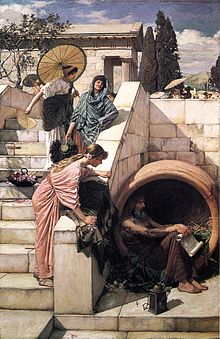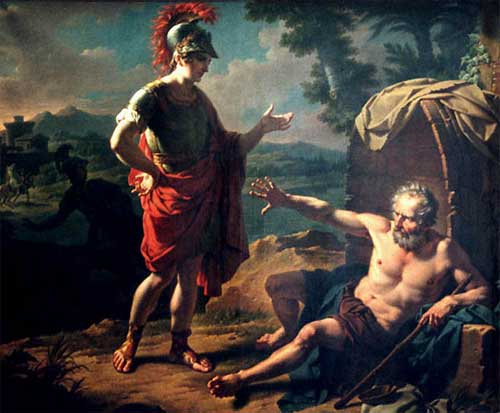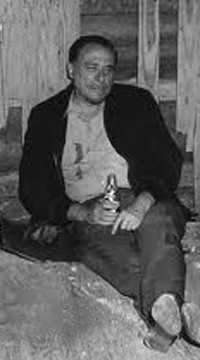Diogenes of Sinope is often considered one of the more eccentric, or at the very least untraditional, of the ancient Greek philosophers. He is credited as being one of the founders of cynicism and practiced these ideals through the eccentricities that filled his life.
It was his belief that all artificial growths of society, such as status and wealth, were unimportant, and could, in fact, be damaging to men’s souls. Diogenes held open contempt for abstract ideals such as reputation, property rights, or patriotism to any city-state.
He is often credited with the first use of the word “cosmopolitan” when he stated: “I am a citizen of the world (cosmopolites).”
While living in Athens, it is said that he resided in a large ceramic jar on the outskirts of the marketplace. He made a career out of begging and lying about; all while surviving on a steady diet of discarded onions. During the day, he wandered the streets with a lantern because he was “looking for an honest man”.
Diogenes was constantly dirty, disheveled, and often smelled of filth. He urinated and defecated in public, and it was not uncommon for him to literally spit in the faces of those who disagreed with him. For this reason, Diogenes was sometimes referred to as “Diogenes the dog”.
Rather than being offended, Diogenes reveled in the idea of being more like a dog. A dog, he believed, was more in touch with nature and therefore more closely in tune with true happiness. The dog does not care for social status or material possessions; the dog does not make himself a slave to the superficial desires that so plague the hearts of men. The dog lives life in the present and does not concern itself with abstract notions that might damage the soul.
The philosopher believed very firmly that man is not above nature. We are inescapably a part of it, and the further we retreat from this truth, hiding behind our lavish houses and material treasures, the further we withdraw from true virtue.
Whatever lessons you wish to learn about cynicism from Diogenes, you will have to do so indirectly. Although it is claimed he authored several books, letters and tragedies; none of them have survived.
So, it is left to us to learn through the anecdotes of his life.
Fortunately, there seem to be no shortage of interesting stories regarding Diogenes of Sinope. One rather intriguing tale that demonstrates Diogenes’ particular brand of philosophy regards an altercation with Plato and a disagreement on the definition of “man”.
As we’ve said, Diogenes disapproved of abstract philosophy, and thus was a harsh critic of Socrates and Plato. At this particular time in Athens, Plato had given Socrates’ definition of a man as a “featherless biped”. This description was highly praised and admired by Athenian intellectuals and commoners alike.
The only person who wasn’t impressed, it would seem, was Diogenes. It is accounted that upon hearing it; Diogenes promptly plucked a chicken of its feathers, visited Plato at his academy, and then threw the featherless bird at the man’s head.
Diogenes declared, “Behold! I give you Socrates’ man!”
It has been told that Plato was so shocked by this “counter argument” that he immediately added to his definition “…with broad, flat fingernails”. The event stuck with Plato and he would later describe Diogenes as ‘Socrates gone mad’.
While Diogenes did not care for Plato or his fascination with intangible philosophy, it appears he held even more contempt for ideas like material wealth and power. And he was not afraid to defy anybody who represented these ideas, even if that person was the most powerful man in the world.
Alexander the Great met with Diogenes one morning in Corinth. The conqueror had heard stories of ‘Diogenes the dog’ and wished to meet the filthy philosopher. The legend goes like this: while Diogenes was bathing in the morning sunlight, Alexander appeared before him. The King of Macedonia asked Diogenes if there was anything he (a man who seemingly had everything) could do for him.
The philosopher responded, “Yes, stand out of my light”.
Alexander was said to have been so impressed with the remark that he then stated “If I were not Alexander, I would wish to be Diogenes”.
Now there are a few interpretations to this story. Maybe Diogenes was sun bathing and did not appreciate the unwarranted shadow that Alexander cast. Or perhaps it means that Alexander, the man who exemplified the ideas of status and material wealth, was standing in the way of Diogenes finding his truth, his light.
Despite the historical setting, the teachings of Diogenes have not been lost to the ages. While the man has long been dead and buried, his spirit is very much alive today.
It is not unreasonable to draw a parallel between the ideas of Diogenes and modern cynics today. Diogenes’ rejection of modern values and material wealth is not unlike the hippy revolution of the late 1960’s.
At the time the social experiment known as “The summer of love” rocked the social and political climate of the United States. It was fueled by a defiant generation that made it a mission to rebel against the conformist values of the Cold War era. And while these modern-day Diogenes’ took strides to find happiness in ‘free love’ and returning to nature, the rest of the world looked on in disbelief.
The ideals of Diogenes can be found in modern writers who have fueled what is sometimes referred to as “The hipster movement”. One of these authors is Charles Bukowski; a man who lived his life trapped in back alleys and seedy bars. Through his writings he seamlessly sews the spirit of Diogenes within the pages of books about degenerates and losers who refuse to care about modern expectations and find their solace in a modern-day ceramic jar and a steady diet of whiskey.
Jack Kerouac and his hipster anthem On the Road could also be considered a modern take on the life of Diogenes. Kerouac writes of young people who sought a life of free exploration, unfettered by the modern aspirations of status and wealth. It is not hard to see the essence of Diogenes reborn when Kerouac states, “Man lowers his head and lunges into civilization, forgetting the days of his infancy when he sought truth in a snowflake or a stick. Man forgets the wisdom of the child”.
The children of Diogenes are the modern nomads and poetic beggars that wander Greenwich Village. They are the aging hippies found on the corner of Haight and Ashbury. They seem content enough to sit all day playing guitar and writing poetry on the terrible state of humanity.
And while some homeless individuals have found their status in life through unfortunate circumstances, there are others who live the way they do very purposefully. They sleep when they want, and eat when they can afford it. They are not concerned with living in an upscale area or finding a job with good benefits.
They wish only for their peace and ask that we stay out of their light.
—
“Diogenes of Sinope and the Modern Cynics” was written by Van Bryan














6 comments
What a fantastic article, incredibly well written and very entertaining. Highly recommend it.
Excellent read my good man! Diogenes’ deep transcendentalism like approach to the materialistic norms of society overshadowing that of the ruthless, all powerful Alexander is simply ground shaking! I enjoyed letting my mind feel free as if Diogenes was shaping it into the simplistic life of creatures such as a blissful canine. Rejecting societal orthodox and getting in touch with you spirit and energy force within the intertwining of nature should be incorporated into some of my meditation! Thank you for this plato.
This article relates very well to Fraternity life and I would say is incredibly FAF
What a great service to open up the contemporary philosophies of
Plato. Having gotten most of the attention, Plato’s philosophies could benefit from finding its own cracks from differing perspectives, as well as point out flaws in that of Diogenes. Excellent read.
Nicely done…excellent tie-in to some of today’s societal mindsets.
STAVROS TRUTH
Truth is a sharp blade,
That separates
Good
From evil!!
Socrates loved the Truth,
Since his youth!
Socrates was one of the deepest
Searchers of Truth!
Love and Truth
is in every innocent heart.
Does not matter what race,
White, Asian, or Black!!
Truth is in the sunshine from above.
True innocence smiles from the heart.
The Truth is,
If have the highest intellect
Above all mankind.
Moreover, to have the gift
And the sense,
To feel and understand
The Language of all birds
And every living species
On earth.
Yet, if I have no love,
Truth, honesty, compassion, and mercy;
Then I’m nothing, I’m worthless!!
Even If I had the ability to know,
Understand and memorize
Each and every book
Throughout all libraries
Of all nations;
Yet, I have no love,
Truth, honesty and compassion
I’m nothing,
I’m absolutely worthless!!
If I have the power to understand
All of the science, to feel and
Understand each and every movement
Of the Solar System
Above all, to have
the power to speak the languages
Of Gods and angels,
Yet, if I have no love,
Truth, honesty and compassion
I’m nothing, I’m worthless.
Moreover, I could be very annoying.
If I have the power
to move mountains,
And to spin the earth
On top of my fingertips
Like Atlas;
And yet, I have no love,
Truth, honesty, compassion,
Then I’m powerless,
I’m nothing,
I’m absolutely worthless!!
If I was king of all the kings,
Ruling justly, righteously,
Precisely, harmoniously,
if I contributed all of my wealth
To feed the poor and the hungry!
And if I accomplish this,
For each and every city
To live in peace precisely
with fulfillment
Without tears or agony;
Everyone to living harmoniously
With Melodies and laughter,
And if I do accomplish this;
And Yet still have no love,
Truth, honesty and compassion.
Then I’m nothing,
I’m totally worthless.
You will find grand truth
In Hypatia Stars,
The victim of LOVE and truth,
In Ruth’s haystack!
You will find grandest truth
In Penelope’s womb!!
Through the history of mankind,
The first ladies of
Real splendor and real Truth
Were Hypatia, Penelope and Antigone.
Every time I think about
These splendid ladies,
Hypatia, Penelope and Antigone,
My heart, my spirit
Reaches to them,
Right through bygones of ages!!
I praise you my ladies
Hypatia, and Penelope
You are the admiration
Of all nations
Ooh My Real GODDESS
HOLIEST PENELOPE!!!
Oh, Dearest Penelope
You are the pride and joy,
Of your Father! ZEUS!!!!!!
Today’s modern ladies with real
Dedication and truth are
Linda Ford Todd*
And Dana Reeves.
They are the admiration
And symbols of real ladies.
Truth approaches the ones
Who know how to share love!
Truth, honesty and love
Always have been described
With very simple words!
*Linda Ford Todd – despite the fact that her husband
has lost his legs and hands in Vietnam,
she has never left his side.
She stood by her family with much dedication and love.
Truth, honesty and love
Is the main bond
Among individuals!!!
Throughout the history of mankind,
To the moralists, preachers,
Historians, leaders,
Wise men, prophets,
Saints and angels,
Truth is the strongest weapon!!
The attraction of enchantment, flattery
And the sweetness of delusion,
Feels and seems so right and perfect,
Until the Truth appears!!!!
Truth is a just tongue,
And is as pure as gold.
Worthless is the tongue
And heart of the wicked!!
Dreadfulness is the injustice
To judge and condemn the righteous!!!
Truth is, if you give good
Instructions and best teachings
To a wicked man
For his own benefit,
He will hate you for it!!
Give good instructions and teachings
To a wise man,
He will become wiser
And he will love you for it.
WITHIN TIME THE TRUTH APPEARS!!!!
The truth is:
Jealousy and envy are like
A iron wall
Which prevents people
To love one another!
The truth is:
As the wise, superior
Confucius said:
“The root of wisdom
Is to be conscientious!”
As Confucius said,
“Three are the virtues
Of perfect man:
Intellect,
Courage,
and truth!”
Not beauty!!!
As Confucius said,
“The character of an individual
Is the main source
Of every sociability
To succeed and progress.”
In addition,
Confucius very truly said:
“The one who speaks humbly and
Is robust in his actions, is the
Superiority among others!
Confucius said,
“The virtuous way to govern
And command
Is with sincerity!
The ruler of a nation must be
An example of virtue!”
A wise man is never selfish,
He gives advice and helps others!!
All the very wise, virtuous men,
Diogenes, Socrates!!
Confucius,
And many other
Teachers and preachers of Truth,
Charge no money!
Their teachings were for free
Because they could not charge
Such a grand fee!!
Socrates: The Greatest, most fortitude,
Imperial Philosopher
The Admiration of many nations,
Better yet
Thaumasiotatos, Thaumatologos!…
There is no scale to weigh,
Measure or estimate the value
To Trade or exchange with gold,
Diamonds, precious pearls or rubies!!
There is no equate
For the priceless teachings
Of wisdom and Truth!!
The Imperial Alexander the Great,
With all his power and glory,
Deeply in his heart,
He desired so much:
If he was not his individuality,
The penniless Diogenes
He wishes to be!!!
As Aristotle states,
“Words of hatred
Are more welcome
Among human beings
Than of words of prudence,
Wisdom and modesty!!”
It takes a lot of Love
to be a real human being!
Beauty and flesh wears out one day,
But Knowledge, Love and Trust
Never grows old!!!!!
Never perish!!!!!!!!
Knowledge, Love and Trust,
Grows much more Beautiful,
As they aged!!!!!!!!
Love always gives
Never asks for reimburse!!
https://classicalwisdom.com/diogenes-of-sinope/
Written by:
Stavros Sitaras Homerides
© Copyright, 2003 573 120
Trackbacks
Our apologies, you must be logged in to post a comment.